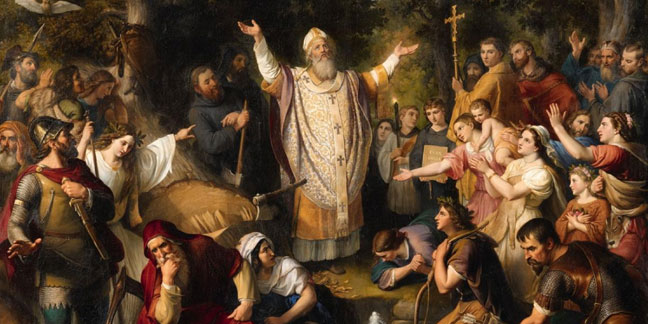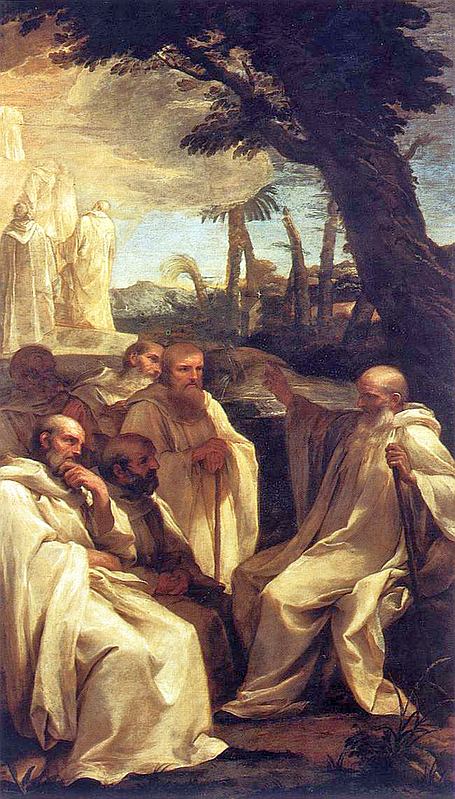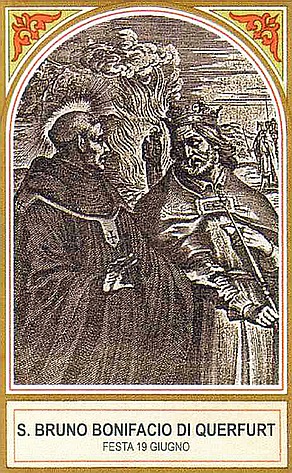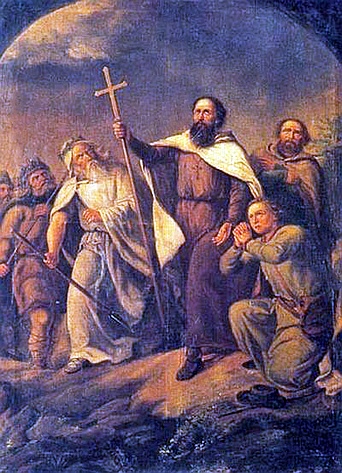
St. Boniface, also called Bruno, was a nobleman of the first rank in Querfurt, Saxony, and agreeable to his high birth was his education in the study of the liberal arts, under Guido the philosopher and other great masters. From his very cradle piety was the dominant inclination of his heart, and he received clerical tonsure and at a very young age. The Emperor Otto III called him to his court, and appointed him his chaplain, with the superintendency and care of the Imperial Chapel. So much was this Emperor taken with the virtue of the young Saint, and with the sweetness of his disposition, that he placed in him an entire confidence, and could not forbear publicly testifying, on every occasion, his tender affection and esteem for him, and usually called him his soul. Boniface was not at all puffed up with this favor, and armed himself against the smiles of prosperity by the constant practice of self-denial, and by the most profound humility. Seeing himself surrounded by vanities and delights, he was sensible that he stood in need of stronger antidotes to preserve himself from their dangerous poison. His tender devotion and his affection for holy prayer, especially for the public Liturgy of the Church, are inexpressible. By his watchfulness and fervor he found his sanctification in the very place where so many others lose their virtue.

One day as the Saint was going into a Church dedicated to St. Boniface, the Bishop of Mainz, Martyr, and apostle of
Germany (image above), he felt his heart suddenly inflamed with an ardent desire to lay down his life for Christ, and in a
pious transport he said to himself: Am I not also called Boniface? Why may I not be a martyr of Jesus Christ as he was, whose
intercession is implored in this place?
From that time on he never ceased sighing after the glory of shedding his blood for
Him Who redeemed us by His most precious death.
 When St. Romuald (image right) came to the Emperor's court in 998, Boniface was charmed with his saintly deportment,
and begged to be admitted into his new Camaldolese Order. He soon after received the habit. It was with the greatest regret that
the Emperor saw him leave his court; but he thought he could not oppose his holy resolution, lest by doing so he should incur the
divine displeasure. St. Boniface inherited the spirit and all the admirable virtues of the great St. Romuald. He who had been
accustomed to sleep on soft beds, to wear rich garments of silk, and to eat at the table of an Emperor, to whom he was most dear;
he who had long seen himself environed with the pomp and splendor of the world, and had been the first and the most favored of the
courtiers, and of all the princes in the Empire, contented himself with one poor coarse habit, walked barefoot, knew no other food
than insipid roots and beans, worked with his hands, earned his bread by the sweat of his brow, led a retired life, lay on straw or
boards, and often, after having worked all day, passed the whole or the greater part of the night in prayer. He often ate only
twice a week – on Sundays and Thursdays, and sometimes he rolled himself among nettles and thorns, so that no part of his body
was without wounds and pain – to punish his flesh for what he called a neglect of penance and mortification in his youth. He with
David, continually begged of God that by His grace He would confirm him in the good purpose which He had begun in his soul, and he
marched a giant's pace in the road of perfection.
When St. Romuald (image right) came to the Emperor's court in 998, Boniface was charmed with his saintly deportment,
and begged to be admitted into his new Camaldolese Order. He soon after received the habit. It was with the greatest regret that
the Emperor saw him leave his court; but he thought he could not oppose his holy resolution, lest by doing so he should incur the
divine displeasure. St. Boniface inherited the spirit and all the admirable virtues of the great St. Romuald. He who had been
accustomed to sleep on soft beds, to wear rich garments of silk, and to eat at the table of an Emperor, to whom he was most dear;
he who had long seen himself environed with the pomp and splendor of the world, and had been the first and the most favored of the
courtiers, and of all the princes in the Empire, contented himself with one poor coarse habit, walked barefoot, knew no other food
than insipid roots and beans, worked with his hands, earned his bread by the sweat of his brow, led a retired life, lay on straw or
boards, and often, after having worked all day, passed the whole or the greater part of the night in prayer. He often ate only
twice a week – on Sundays and Thursdays, and sometimes he rolled himself among nettles and thorns, so that no part of his body
was without wounds and pain – to punish his flesh for what he called a neglect of penance and mortification in his youth. He with
David, continually begged of God that by His grace He would confirm him in the good purpose which He had begun in his soul, and he
marched a giant's pace in the road of perfection.
Having spent some years, first at Monte Cassino, afterwards under the direction of St. Romuald at Pereum near Ravenna, and lastly in an eremitical life, he obtained his superior's leave to go and preach the Gospel to the infidels. He therefore went to Rome barefoot, singing psalms all the way, and allowing himself no other sustenance than half a pound of bread a day with water, and on Sundays a small quantity of roots or fruit. When he arrived at Rome, Pope John XVIII approved his plan, gave him all necessary faculties, and obliged him to accept a document, directing that he should be consecrated archbishop as soon as he should open his mission. St. Boniface offered himself to God as a victim ready to be sacrificed for the salvation of his brethren; and in these fervent sentiments he travelled into Germany in the depth of a severe winter. He on that occasion sometimes made use of a horse, but always rode or walked barefoot, and it was often necessary to thaw his feet with warm water before he could draw them out of the stirrups in which they were frozen.
The Saint went to Meersburg on Lake Constance to ask for the protection of St. Heinrich II, Holy Roman Emperor. Having readily obtained it, he was consecrated bishop by Archbishop Taymont of Magdeburg, who conferred on him the archbishop's pallium, which St. Boniface himself had brought from Rome according to the Pope's command. The holy prelate, notwithstanding the fatigues of his missions, continued his severe fasts and watchings, and devoted all his time on his journeys to prayer, especially to the reciting of the psalms, in which he found great sweetness and delight. He also found time to write – one of his works being a Life of St. Adalbert of Prague, whom he had met at Rome while attending the coronation of Emperor Otto III.
His desire to rescue souls from the blindness of sin and idolatry seemed insatiable; and the savage inhabitants of Prussia appearing to be the fiercest and most obstinate in their malice, he made them the first objects of his zeal. Boleslas, Duke of Poland, and many great lords made him rich presents; all of which he gave to the churches and to the poor, reserving nothing for himself. He wished only for Heaven as the reward of his labors; everything else appeared unworthy of his ministry, and too much beneath what he hoped for. He even feared that it might diminish his eternal reward or infect his heart. While in Poland he consecrated the first bishop of Sweden, and is said to have sent emissaries to baptize one of the kings of Sweden, whose mother had come from Poland.

It was in the twelfth year after his conversion from the world that he entered Prussia. But the time of the visit of the Lord was not yet come for the idolaters of that country, although the Bollandists think that in his mission to Prussia, St. Boniface converted to the Faith the Livonians and Samogitians – who lived in what is today Lithuania. It is also held that he converted and baptized a number of the Pechenegs (image above), near Kyiv, and even consecrated a bishop for them. The Saint desired at least to die a martyr among the Prussians; but they, remembering that the martyrdom and subsequent miracles of St. Adalbert of Prague had been an inducement to many to embrace the Faith, refused him the wished-for happiness of sealing his love for Christ with his blood.

 St. Boniface being thus repulsed, advanced to the borders of Russia, began there with great zeal to announce the Gospel.
The Russians at that time were all barbarous idolaters, and had abated nothing of their ancient ferocity when St. Boniface undertook
to plant the Gospel among them. They sent him an order to leave their territories, and forbade him to preach the Faith in their
dominions. The Saint paid no regard to this prohibition, and as he advance into the country, the king of a small province was
desirous to hear him. But when this king, named Netimer, saw him bare-foot and poorly clad, he treated him with contempt, and would
not hear him speak. The holy Bishop withdrew, and having put on better clothing which he carried with him to wear when offering Mass,
he returned to the court. The king told him he would believe in Christ, if he could see the Saint walk through a great fire without
any harm. St. Boniface, by a divine inspiration, undertook to perform the miracle in the presence of the king, who seeing him
miraculously preserved amidst the flames, desired to be instructed in the Faith, and was baptized with many others (image left).
St. Boniface being thus repulsed, advanced to the borders of Russia, began there with great zeal to announce the Gospel.
The Russians at that time were all barbarous idolaters, and had abated nothing of their ancient ferocity when St. Boniface undertook
to plant the Gospel among them. They sent him an order to leave their territories, and forbade him to preach the Faith in their
dominions. The Saint paid no regard to this prohibition, and as he advance into the country, the king of a small province was
desirous to hear him. But when this king, named Netimer, saw him bare-foot and poorly clad, he treated him with contempt, and would
not hear him speak. The holy Bishop withdrew, and having put on better clothing which he carried with him to wear when offering Mass,
he returned to the court. The king told him he would believe in Christ, if he could see the Saint walk through a great fire without
any harm. St. Boniface, by a divine inspiration, undertook to perform the miracle in the presence of the king, who seeing him
miraculously preserved amidst the flames, desired to be instructed in the Faith, and was baptized with many others (image left).
The infidels were alarmed at this progress of the Gospel, and again threatened the Saint if he proceeded further into their country (image right). But words could not daunt him who thirsted after nothing more earnestly than the glory of martyrdom. The barbarians soon after seized and beheaded St. Boniface at the instigation of Zebeden, the brother of the converted King Netimer. Most of his companions were later hanged, all suffering martyrdom in the year 1009. The Roman Martyrology proposes him to our veneration on June 19, together with his eighteen companions (although the martyrdom of St. Boniface himself may have occurred in February or March), and again under the name of St. Bruno on October 15 – perhaps the date of the translation of some of his relics.
NEW: Alphabetical Index
Contact us: smr@salvemariaregina.info
Visit also: www.marienfried.com